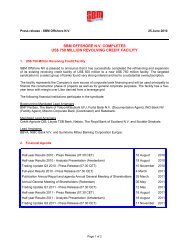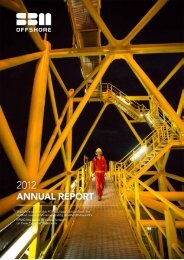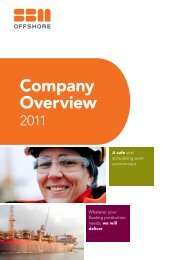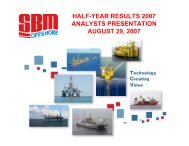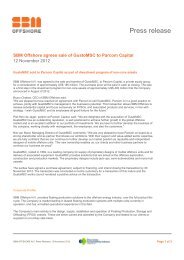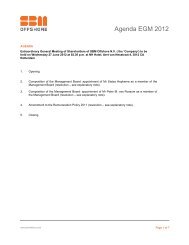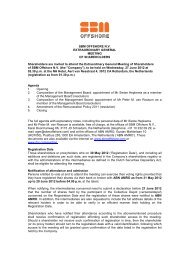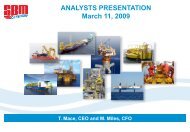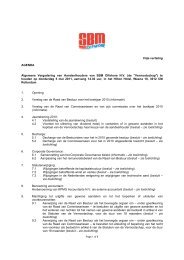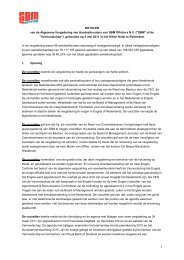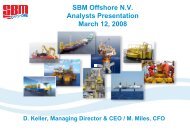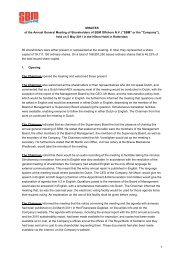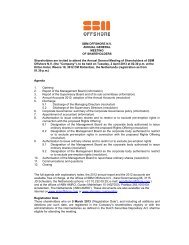1 DRAFT MINUTES of the Annual General Meeting ... - SBM Offshore
1 DRAFT MINUTES of the Annual General Meeting ... - SBM Offshore
1 DRAFT MINUTES of the Annual General Meeting ... - SBM Offshore
Create successful ePaper yourself
Turn your PDF publications into a flip-book with our unique Google optimized e-Paper software.
taken in <strong>the</strong> remuneration policy and she complimented <strong>the</strong> board for doing so. The positive elements in <strong>the</strong><br />
proposed policy are (i) <strong>the</strong> shift from short- to long-term remuneration elements, (ii) <strong>the</strong> changes in <strong>the</strong> peer<br />
group, (iii) <strong>the</strong> integration <strong>of</strong> CSR factors in <strong>the</strong> performance criteria within <strong>the</strong> remuneration policy and (iv)<br />
<strong>the</strong> incorporation <strong>of</strong> a claw-back and <strong>the</strong> power <strong>of</strong> <strong>the</strong> Supervisory Board to amend employment contracts.<br />
She noted that no extra performance criteria were attached to <strong>the</strong> share matching element. Several<br />
companies had included a share matching element in <strong>the</strong>ir remuneration policy, but this extra assignment <strong>of</strong><br />
shares was linked to performance criteria. She expressed <strong>the</strong> hope that <strong>SBM</strong> would in <strong>the</strong> future consider<br />
introducing this element (first remark). Her second remark referred to <strong>the</strong> performance shares that may be<br />
assigned if <strong>SBM</strong> performs under <strong>the</strong> median <strong>of</strong> <strong>the</strong> peer group. Proper Corporate Governance implies that<br />
shares should only be assigned if <strong>SBM</strong> performs above <strong>the</strong> median. She noted that she had stated before<br />
that <strong>the</strong> implementation <strong>of</strong> CSR factors in <strong>the</strong> remuneration policy was <strong>the</strong> right choice, but <strong>the</strong>re was still<br />
great uncertainty about how and what targets were involved (third remark). She hoped that this would<br />
become clearer in <strong>the</strong> future. The Chairman thanked Ms Lindeman and noted that <strong>the</strong>se were three points<br />
that would be answered in more detail. He gave <strong>the</strong> floor to Mr Gugen. Mr Gugen replied, in terms <strong>of</strong> <strong>the</strong><br />
share matching element on <strong>the</strong> STI, that it's helpful to step back and think about how <strong>the</strong> STI works. The<br />
STI is primarily a cash tool and it is a reward for <strong>the</strong> performance in <strong>the</strong> previous year. Quite a lot <strong>of</strong> thought<br />
was given to <strong>the</strong> question that was raised by Mrs Lindeman, but what has been done with <strong>the</strong> STI is that<br />
<strong>SBM</strong> could and probably, arguably, should pay all <strong>of</strong> that in cash. Because <strong>the</strong>re was <strong>the</strong> intention to move<br />
and to keep <strong>the</strong> onus wherever possible on shares as opposed to cash, we have chosen to take an element<br />
<strong>of</strong> that reward for that performance in <strong>the</strong> previous year, put it into shares, hold it back and <strong>the</strong>n release it<br />
later. The performance criteria for that is in fact <strong>the</strong> previous year’s performance against which it is<br />
measured. It would be strange to introduce a second performance and different element in relation to<br />
something which is geared very specifically to a reward for <strong>the</strong> previous element. The future element is<br />
rewarded by <strong>the</strong> LTI in a very deliberate form. The Chairman added that staff retention is also an element.<br />
Mr Gugen indicated that by having a share-based element and by holding that share-based element back,<br />
<strong>the</strong>re is an incentive that <strong>the</strong> good people have to stay with <strong>the</strong> Company ra<strong>the</strong>r than to be stolen away. In<br />
this industry <strong>the</strong> competition for people is not going down. It became quite fierce. In relation to performance<br />
under <strong>the</strong> median <strong>of</strong> <strong>the</strong> peer group (second remark), this is something which was given some thoughts and<br />
one <strong>of</strong> <strong>the</strong> key reasons that we ended up where we are is that remuneration is targeted by reference to <strong>the</strong><br />
median, not <strong>the</strong> upper quartile. Particularly for <strong>the</strong> TSR it seemed a little anomalous to have a threshold that<br />
was already at median and above and to reward on median overall as well. He indicated that <strong>the</strong> Committee<br />
will continue to study, because <strong>the</strong> TSR is only introduced. He indicated that <strong>the</strong> Committee wants to see<br />
how it works and wants to make sure that it does what it should do, which is to align <strong>the</strong> managers with <strong>the</strong><br />
shareholders and that <strong>the</strong>y are only getting rewarded in fact if <strong>the</strong> shareholders would get rewarded. In<br />
terms <strong>of</strong> CSR and lack <strong>of</strong> clarity (third remark) he indicated that it’s deliberately lack <strong>of</strong> clarity, because <strong>the</strong><br />
Committee is trying to learn and will get into more detail going forwards. He stated that he will see how CSR<br />
could migrate fur<strong>the</strong>r through <strong>the</strong> remuneration mechanisms going forwards.<br />
Mr Heineman noted (first remark) that <strong>the</strong> Company would like to look more closely at o<strong>the</strong>r countries in<br />
terms <strong>of</strong> remuneration, principally <strong>the</strong> United States. In addition (second remark), it was much easier to<br />
dismiss employees in <strong>the</strong> United States than in <strong>the</strong> Ne<strong>the</strong>rlands. He <strong>the</strong>refore questioned this point. He also<br />
noted (third remark) that he believed that remuneration in shares would induce managers to take high-risk<br />
decisions whose effect may not transpire until years later. Decisions that may at first have advantages may<br />
ultimately prove catastrophic. Mr Gugen answered that Mr Heineman asked about looking abroad and if<br />
looking abroad meant looking to <strong>the</strong> United States <strong>of</strong> America (first remark). Inevitably most <strong>of</strong> <strong>SBM</strong>'s<br />
competitors are in <strong>the</strong> United States <strong>of</strong> America, but looking at <strong>the</strong> 18 companies that make up <strong>the</strong> peer<br />
group, which is in <strong>the</strong> documentation, one can see that only roughly half are American. <strong>SBM</strong> deliberately<br />
worked at that to not make it a completely US-centric approach, but one shouldn’t lose sight <strong>of</strong> <strong>the</strong> fact that<br />
<strong>the</strong> principle competition for a lot <strong>of</strong> <strong>the</strong> top quality people that <strong>SBM</strong> has is inevitably coming from <strong>the</strong> United<br />
19



